The claim that chlorinated water can induce skin darkening is more of a fiction than a fact. Chlorine is widely used in swimming pools to eliminate microorganisms and preserve water quality. While chlorine can induce skin irritation, dryness, or itching, there is limited evidence that it causes skin browning. Sun exposure, hormonal fluctuations, inflammation, and certain drugs or skincare products can all contribute to skin darkening, also known as hyperpigmentation. Chlorine exposure alone is unlikely to induce substantial hyperpigmentation in most people.
As ,the relationship between chlorine and skin colour is still a topic of interest. Let us differentiate between facts and myths.
Facts:
-
In swimming pools, chlorine is commonly used as a disinfectant to kill bacteria and keep the water clean.
-
Prolonged exposure to chlorinated water can cause skin dryness, and irritation, and worsen certain skin conditions such as eczema or dermatitis, particularly for people with sensitive skin.
-
Chlorinated water may make the skin more sensitive to sunlight, potentially leading to sunburns and skin damage if proper protection is not used.
Myths:
-
There is no substantial evidence that chlorine exposure causes permanent skin colour changes. While prolonged contact with chlorinated water may cause temporary lightening or darkening of the skin due to variables such as dryness or irritation, these effects are usually reversible and do not result in long-term changes in skin pigment.
-
Chlorine is not a skin-bleaching agent. Any whitening or darkening of the skin that occurs after being exposed to chlorinated water is usually temporary and caused by factors such as hydration, skin irritation, or ultraviolet exposure.
-
The effect of chlorine on skin colour varies widely between individuals and is impacted by skin type, sensitivity, frequency of exposure, and overall skincare practices. Individual variances must be considered when examining the impact of chlorine on skin colour.
The Science Behind Chlorine Exposure and Skin Health
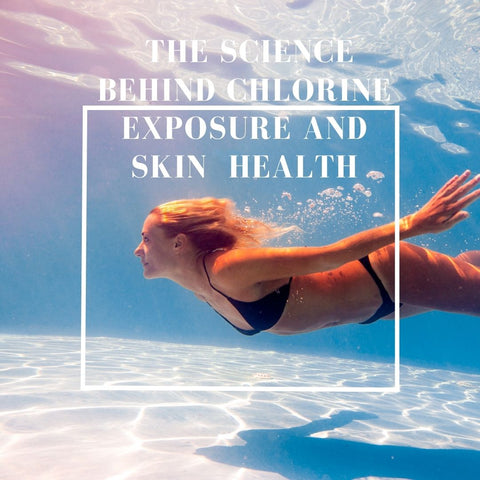
Chlorine exposure and its effects on skin health are topics of ongoing scientific research. Here's an overview of our current understanding:
-
Chlorine is commonly used as a disinfectant in swimming pools to kill bacteria, viruses, and other pathogens, ensuring water hygiene and safety.
-
Chlorine can cause skin irritation, dryness, and itching, especially in people with sensitive skin. This irritation could be attributed to chlorine's ability to disrupt the skin's natural protective barrier and strip away its natural oils, resulting in dryness and irritation.
-
Chlorine exposure has been linked to the exacerbation of certain skin conditions, including eczema and dermatitis. Individuals with pre-existing skin conditions may experience worsened symptoms, such as itching, redness, and inflammation, after being exposed to chlorine water.
-
Chlorine exposure may cause the skin to become more sensitive to sunlight, increasing the risk of sunburn and other skin damage. This increased sensitivity could be related to the drying effect of chlorine on the skin, which can weaken the skin's natural UV protection layer.
-
Prolonged exposure to chlorinated water, especially in outdoor pools under strong sunlight, may accelerate the ageing process of the skin, according to certain studies. When combined with UV rays, chlorine exposure can cause oxidative stress, collagen deterioration, and skin damage, all of which can hasten the ageing process.
-
Prolonged exposure to chlorinated water may cause temporary lightening or darkening of the skin, though there is little evidence to suggest that chlorine exposure directly causes changes in skin pigmentation. These alterations are usually reversible and frequently come from irritation, dryness, or melanin oxidation.
-
Preventive measures include showering before and after swimming to remove chlorine residue, moisturising the skin with moisturisers, and wearing sunscreen to protect against UV rays. These actions can help reduce the potential negative effects of chlorine exposure on skin health.
Understanding Chlorine's Impact on Skin Melanin
According to current knowledge, chlorine's effect on skin melanin—the pigment responsible for skin coloration—is relatively limited. Melanin production is primarily regulated by genetic factors and UV exposure, not chlorine exposure. However, prolonged exposure to chlorinated water may indirectly affect skin melanin in a variety of ways.
-
Chlorine is known to deplete the skin's natural oils, resulting in dryness and irritation. In response to irritation, the skin may produce excess melanin as a protective mechanism, resulting in temporary skin darkening, especially in areas prone to friction or rubbing.
-
Individuals with sensitive skin or pre-existing hyperpigmentation conditions may notice an exacerbation of dark spots or patches after prolonged exposure to chlorinated water. This could be due to irritation and inflammation caused by chlorine, which can stimulate melanocyte activity and result in increased melanin production in affected areas.
-
Chlorine exposure, especially in outdoor pools exposed to sunlight, can cause oxidative stress in the skin. Oxidative stress can disrupt melanin production and distribution, leading to uneven skin tone or pigmentation changes over time.
-
Chlorine exposure may interact with other factors that affect melanin production, such as UV radiation and hormonal fluctuations. For example, exposure to both chlorine and sunlight in outdoor pools may increase the risk of sunburn and cause melanin synthesis as a protective response.
Debunking the Myth: Does Chlorine Really Darken Skin?
The idea that chlorine darkens the skin is primarily a fallacy with no scientific basis. Chlorine is a disinfectant widely used in swimming pools to destroy microorganisms and keep the water clean. While prolonged contact with chlorinated water can cause skin dryness, and irritation, and exacerbate some skin disorders, such as eczema or dermatitis, it does not result in permanent skin darkening. Temporary variations in skin colour observed after swimming in chlorinated water are mainly caused by causes such as:
-
Dryness and Irritation: Chlorine can deplete the skin's natural oils, causing dryness and irritation. In response, the skin may produce excess melanin as a protective mechanism, resulting in temporary darkening or hyperpigmentation. However, this effect is reversible and typically disappears once the skin's moisture balance is restored.
-
UV Exposure: Chlorinated pools are frequently found outdoors, where people may be exposed to sunlight. Exposure to chlorine and UV radiation can increase the risk of sunburn and stimulate melanin production, resulting in temporary tanning or darkening of the skin. However, the darkening is primarily caused by UV exposure rather than chlorine itself.
-
Skin Sensitivity: People with sensitive skin or pre-existing skin conditions may experience temporary darkening or hyperpigmentation after swimming in chlorinated water due to irritation and inflammation. However, this darkening is usually transient and does not result in permanent changes in skin colour.
Antioxidant Protection Against Chlorine-Induced Damage
Chlorine exposure, especially in chlorinated water like swimming pools, has the potential to cause oxidative stress and skin damage. Antioxidants protect the skin from such damage by neutralising free radicals and reducing oxidative stress. Here are some antioxidants that could protect against chlorine-induced skin damage:
-
Vitamin C: Ascorbic acid, also known as vitamin C, is a powerful antioxidant that helps to neutralise free radicals and regenerate other antioxidants in the skin. It can help protect the skin from chlorine-induced oxidative damage while also promoting collagen synthesis and skin repair.
-
Vitamin E: Tocopherol, or vitamin E, is another potent antioxidant that shields the skin from oxidative damage. It helps to keep skin hydrated, enhances skin barrier function, and may minimise inflammation caused by chlorine exposure.
-
Selenium: Selenium is a trace mineral that serves as a cofactor for antioxidant enzymes like glutathione peroxidase, which help protect the skin from oxidative stress. Selenium supplementation or the ingestion of selenium-rich foods may improve the skin's antioxidant defences against chlorine-induced damage.
-
Green Tea Extract: Green tea includes polyphenols like epigallocatechin gallate (EGCG), which have potent antioxidant and anti-inflammatory properties. Green tea extract, applied topically or taken orally, may help protect the skin from oxidative stress and inflammation induced by chlorine exposure.
-
Resveratrol: Resveratrol, a polyphenolic molecule found in red grapes, berries, and peanuts, is known to have antioxidant and anti-inflammatory properties. It can help neutralise free radicals and minimise the oxidative damage that chlorine exposure causes to the skin.
-
Astaxanthin: Astaxanthin is a carotenoid antioxidant found in algae and shellfish that is noted for its high antioxidant activity. It can help protect the skin from UV rays and oxidative stress, which may be useful in preventing chlorine-induced skin damage.
-
Coenzyme Q10 (CoQ10): Coenzyme Q10 is a naturally occurring antioxidant that helps to neutralise free radicals and renew other antioxidants in the skin. It can help protect against oxidative damage caused by chlorine exposure while also promoting cellular energy generation and skin health.
Effective Skincare Strategies for Swimmers
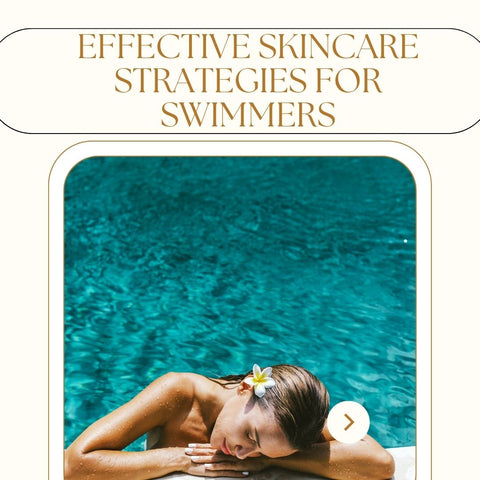
Swimmers frequently face unique skincare challenges as a result of repeated exposure to chlorine and other chemicals in pool water, as well as extended sun exposure. Here are some effective skincare strategies specifically tailored for swimmers:
-
Pre-Swim Protection: Before swimming, apply a waterproof barrier cream or petroleum jelly to create a protective barrier on the skin, reducing chlorine absorption. Consider wearing swim caps, goggles, and rash guards to minimize skin exposure to chlorinated water and reduce irritation.
-
Post-Swim Skincare: Rinse off with fresh water immediately after swimming to remove chlorine and pool chemicals from the skin. Wash with a mild, fragrance-free cleanser to remove chlorine residue and prevent skin dryness. To hydrate the skin and replenish moisture lost while swimming, use a moisturiser containing humectants such as hyaluronic acid or glycerin. Utilise skincare products that contain antioxidants, such as green tea extract or vitamin C, to combat oxidative stress brought on by exposure to chlorine. Even if swimming indoors, UV radiation can penetrate glass windows and cause sun damage. Apply a broad-spectrum sunscreen with SPF 30 or higher to protect exposed skin from harmful UV rays.
-
Hydration and Nutrition: Drink plenty of water before and after swimming to stay hydrated and flush out toxins from the body. Consume a diet rich in antioxidants, vitamins, and minerals to support overall skin health and repair damaged skin cells.
-
Skincare Routine: Use a gentle exfoliant 1-2 times per week to remove dead skin cells and prevent clogged pores. Incorporate moisturizing and hydrating skincare products, such as serums and masks, to replenish the skin's moisture barrier. Apply a hydrating lip balm and use a swim cap to protect your hair from chlorine damage and dryness.
-
Professional Treatments: Consider getting regular facials or professional treatments to deeply cleanse and hydrate the skin, addressing any issues caused by chlorine exposure. Periodic chemical peels can help improve skin texture and tone, reducing the appearance of hyperpigmentation or uneven skin caused by chlorine exposure.
By incorporating these skincare strategies into your routine, you can protect your skin from the harmful effects of chlorine while also maintaining a healthy complexion, even if you swim frequently. Remember to see a dermatologist if you have persistent skin issues or irritation.
Essential Pre-Swim Skincare to Shield Against Chlorine
Pre-swim skincare is essential for protecting your skin from the damaging effects of chlorine. Here's an important pre-swim skincare routine to protect against chlorine:
-
Drink plenty of water before swimming to hydrate your skin from the inside out. Well-hydrated skin is less prone to damage from chlorine exposure.
-
Before entering the pool, apply a thick layer of petroleum jelly or a silicone-based barrier cream to exposed areas of the skin. This creates a protective barrier that helps prevent chlorine from penetrating the skin and causing dryness or irritation.
-
Consider wearing a rash guard or swim shirt made of UV-protective fabric to cover as much skin as possible. This provides an additional layer of protection against chlorine and reduces direct contact with pool water.
-
Apply a waterproof sunscreen with a high SPF to exposed areas of skin, such as the face, neck, arms, and legs. Choose a broad-spectrum sunscreen that offers protection against both UVA and UVB rays.
-
If you have long hair, consider wearing a swim cap to protect it from chlorine exposure. You can also apply a leave-in conditioner or hair oil to create a protective barrier and prevent chlorine from drying out your hair.
-
Swim goggles will protect your eyes from the irritation and redness caused by chlorine exposure. Look for goggles with silicone seals to provide a tight, waterproof seal around your eyes.
-
Take a quick shower before entering the pool to get clean water on your skin and hair. This reduces the absorption of chlorinated water into your skin and hair.
By following these pre-swim skincare steps, you can protect your skin from the harmful effects of chlorine and keep it healthy and hydrated even after swimming in chlorinated pools.
Immediate Post-Swim Routines to Neutralize Chlorine Effects
Following a swim in chlorinated water requires a post-swim skincare routine to neutralise the effects of chlorine and prevent skin irritation and dryness. Here is a quick post-swim routine to help you protect your skin:
-
Shower Immediately: After swimming, rinse your skin and hair with lukewarm water to remove chlorine and pool chemicals. Avoid using hot water because it will further dry out your skin.
-
Use a Gentle Cleanser: To remove any remaining chlorine residue and sweat, wash your body and face with a mild, sulfate-free cleanser. Look for cleansers designed specifically for swimmers or sensitive skin.
-
Moisturise: While your skin is still damp from the shower, apply a hydrating moisturiser. Look for moisturisers with hyaluronic acid, glycerin, or ceramides to replenish moisture and restore the skin's barrier function.
-
Focus on Problem Areas: Pay special attention to areas of the skin prone to dryness or irritation, such as the elbows, knees and ankles. Apply a thicker moisturizer or a hydrating balm to these areas to prevent dryness and discomfort.
-
Protect Your Hair: Rinse your hair thoroughly with clean water to remove chlorine and pool chemicals. Apply a hydrating conditioner or hair mask to replenish moisture and prevent chlorine-induced dryness and damage.
-
Apply Lip Balm: Use a moisturising lip balm to prevent dryness and chapping, especially if you spend a lot of time swimming outside in the sun.
-
Rehydrate: Drink plenty of water to replenish your body's internal fluids. Swimming can be dehydrating, so replenish lost fluids with water or electrolyte-rich beverages.
-
Consider Eye Drops: If your eyes are dry or irritated after swimming, try lubricating eye drops to soothe and hydrate them.
Following these immediate post-swim skincare steps will help neutralise the effects of chlorine on your skin and hair, keeping them hydrated and healthy even after swimming in chlorinated pools.
Long-Term Skin Care Tips for Frequent Swimmers
Regular swimmers confront special issues due to chlorine and other chemicals in pool water, as well as prolonged sun exposure. To maintain healthy skin over time, here are some vital skincare suggestions for frequent swimmers, including pre-swim protection, post-swim skincare, hydration and nutrition, a skincare routine, and professional treatments. By including these skincare practices into your routine, you can protect your skin from the detrimental effects of chlorine while also maintaining a healthy complexion, even if you swim frequently. Remember to see a dermatologist if you have chronic skin concerns or discomfort.
Beyond the Pool: Comprehensive Skincare After Chlorine Exposure
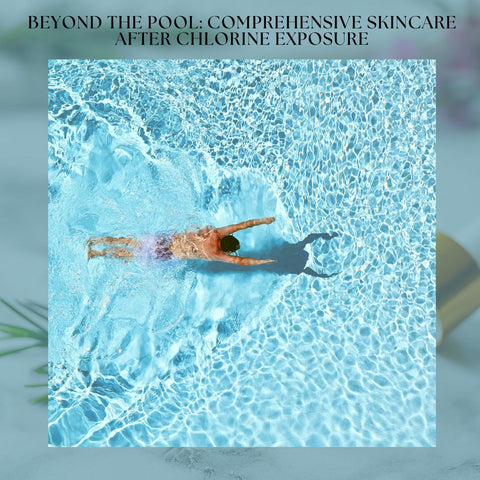
Beyond the pool, comprehensive skincare following chlorine exposure is critical for maintaining skin health and mitigating the effects of chlorine. Here's a detailed skincare regimen you can follow:
-
Pre-Swim Protection:
-
Barrier Cream: Before swimming, use a waterproof barrier cream or petroleum jelly to form a protective barrier on the skin, reducing chlorine absorption.
2. Post-Swim Skincare:
-
Shower Immediately: To remove chlorine and pool chemicals from your skin, rinse with lukewarm water as soon as possible after swimming.
-
Gentle Cleanser: To remove chlorine residue and sweat without stripping the skin of its natural oils, use a mild, fragrance-free cleanser.
-
Moisturise: Apply a hydrating moisturiser to damp skin to seal in moisture and replace hydration lost while swimming.
-
Antioxidants: Use antioxidant-rich skincare products such as vitamin C or green tea extract to neutralise free radicals and reduce oxidative stress caused by chlorine exposure.
-
Sunscreen: Use a broad-spectrum sunscreen with an SPF of 30 or higher to protect your skin from UV rays, even if swimming indoors.
-
Lip Balm: To avoid dryness and chapping, use a moisturizing lip balm, especially if swimming outside in the sun.
-
Hair Care: To restore moisture and protect against chlorine damage, thoroughly rinse your hair with fresh water and apply a hydrating conditioner or mask.
-
Eye Care: After swimming with goggles, use lubricating eye drops to soothe and hydrate dry or itchy eyes.
3. Hydration and Nutrition:
-
Water: To stay hydrated and eliminate toxins from the body, drink lots of water throughout the day to replace lost fluids.
-
Eat Antioxidant-Rich Foods: To promote skin health and heal damaged cells, eat a balanced diet full of fruits, vegetables, and omega-3 fatty acids.
You can reduce the negative effects of chlorine exposure and keep your skin looking great even when you are not in the pool by adhering to this thorough skincare routine. Depending on your skin type and unique requirements, you might need to modify your skincare regimen.
Restorative Moisturizing Treatments for Chlorine-Affected Skin
Restorative moisturising treatments are essential for replenishing moisture and repairing chlorine-induced damage. Here are some effective treatments for chlorine-damaged skin:
-
Hydrating Masks: To deeply hydrate and soothe chlorine-affected skin, apply hydrating sheet masks or gel masks infused with hyaluronic acid, aloe vera, or glycerin. Apply the mask to clean the skin and let it sit for 15-20 minutes before gently massaging away any excess serum.
-
Occlusive Moisturisers: Use occlusive moisturisers with ingredients like petrolatum, dimethicone, or shea butter to form a protective barrier on the skin, locking in moisture and preventing additional water loss. To ensure maximum hydration, apply a thick layer of moisturiser to damp skin after showering.
-
Emollient-rich Creams: Look for creams or ointments containing ceramides, fatty acids, and cholesterol to help repair the skin barrier and restore lipid balance. These creams provide long-lasting hydration and aid in the repair of chlorine-induced damage.
-
Oil-based Serums: Use nourishing oils such as jojoba, argan, or rosehip oil to replenish moisture and improve skin elasticity. Apply a few drops of serum to clean, damp skin and gently massage until completely absorbed.
-
DIY Moisturizing Treatments: Make your moisturising treatments with natural ingredients such as honey, yoghurt, avocado, and oatmeal. These compounds are high in vitamins, minerals, and antioxidants, which moisturise and soothe inflamed skin. Mix the ingredients to make a paste, then apply it to the skin for 10-15 minutes before rinsing with lukewarm water.
-
Hyaluronic Acid Serums: Hyaluronic acid is a strong humectant that draws and maintains moisture in the skin, making it an excellent choice for moisturising chlorine-damaged skin. To increase moisture and plumpness, apply a hyaluronic acid serum underneath your moisturiser.
-
Overnight Masks: Apply moisturising and nourishing overnight masks or sleeping packs to your skin before going to bed to allow the benefits to soak in as you sleep. Wake up with smooth, supple, and revitalised skin.
-
Cooling Gel Treatments: Cooling gel treatments or gels containing substances such as cucumber extract or menthol can help soothe sensitive skin and minimise redness and inflammation caused by chlorine exposure.
Natural Remedies to Counteract Chlorine's Drying Effects
Natural remedies can effectively combat chlorine's drying effects on the skin. Here are some alternatives to consider:
-
Coconut Oil: Coconut oil is high in fatty acids and has moisturising properties that can help hydrate and soothe dry, itchy skin. After showering, apply a small amount of coconut oil to the affected areas to help retain moisture.
-
Oatmeal Bath: Oatmeal has anti-inflammatory properties that can relieve dry, itchy skin. Add colloidal oatmeal to your bathwater and soak for 15-20 minutes to relieve irritation and restore moisture to your skin.
-
Honey: Honey is a natural humectant that draws and holds moisture in the skin. Apply raw honey directly to dry skin and leave on for 10-15 minutes before rinsing with warm water.
-
Aloe Vera: The cooling and moisturising qualities of aloe vera gel can help calm and moisturise dry, irritated skin. Apply fresh aloe vera gel to the affected areas and let it sit until absorbed.
-
Cucumber: Cucumber contains hydrating and soothing properties that can help relieve dryness and irritation. Place cucumber slices on the affected areas or make a paste and apply to the skin for 10-15 minutes before rinsing.
-
Avocado: Avocado is high in vitamins and fatty acids, which nourish and moisturise the skin. Mash a ripe avocado and apply it to dry areas of the skin for 15-20 minutes before rinsing with warm water.
-
Green Tea: Green tea contains antioxidants and anti-inflammatory compounds that can help to protect and moisturise the skin. Brew green tea, let it cool, and apply it to your skin as a soothing compress with a cotton pad or cloth.
-
Jojoba Oil: Jojoba oil closely resembles the skin's natural sebum and can aid in moisture restoration. Apply a few drops of jojoba oil to dry areas of your skin and massage until absorbed.
The Role of Diet and Hydration in Combatting Chlorine Damage
Diet and hydration are essential for preventing chlorine damage to the skin. Here's how it is done:
-
Hydration: Staying hydrated is critical for keeping skin healthy, especially after chlorine contact. Chlorine can deplete the skin's natural oils and moisture, causing dryness and dehydration. Drinking plenty of water replenishes lost fluids, eliminates toxins, and hydrates the skin from the inside out. Aim to drink at least eight glasses of water every day, and up your intake if you swim regularly or in chlorine-filled pools.
-
Electrolyte Balance: Chlorine exposure can affect the body's electrolyte balance, causing dehydration and muscle cramping. Consuming electrolyte-rich foods and beverages, such as coconut water, sports drinks, bananas, and leafy greens, can aid in electrolyte balance and hydration.
-
Antioxidant-Rich Foods: Antioxidant-rich meals protect the skin from the oxidative stress and inflammation induced by chlorine exposure. Consume plenty of fruits, vegetables, nuts, seeds, and whole grains to offer your body with necessary vitamins, minerals, and antioxidants. Foods strong in vitamin C, E, beta-carotene, and omega-3 fatty acids are especially good to skin health.
-
Healthy Fats: Consuming good fats, including omega-3 fatty acids found in fatty fish, flaxseeds, chia seeds, and walnuts, helps nourish and moisturise the skin from within. These fats serve to maintain the skin's lipid barrier, which prevents moisture loss and protects against dryness and irritation.
-
Collagen-Boosting Foods: Chlorine exposure can damage collagen fibres in the skin, causing premature ageing and wrinkles. Consuming collagen-boosting foods, such as bone broth, collagen peptides, and meals high in vitamin C and amino acids, can aid in collagen formation and skin cell repair.
-
Limiting Sugary and Processed Foods: Sugary and processed foods can cause inflammation and oxidative stress in the body, increasing chlorine damage to the skin. Limit your intake of sugary snacks, processed foods, and refined carbohydrates, and instead opt for a well-balanced diet high in whole, nutrient-dense foods.
By including hydrating foods and beverages, antioxidant-rich foods, and collagen-boosting nutrients in your diet, you can help combat the damaging effects of chlorine on the skin while also supporting overall skin health and hydration. Furthermore, drinking plenty of water is essential for keeping your skin hydrated and resistant to chlorine damage.
Advanced Skincare Innovations for Chlorine Exposure
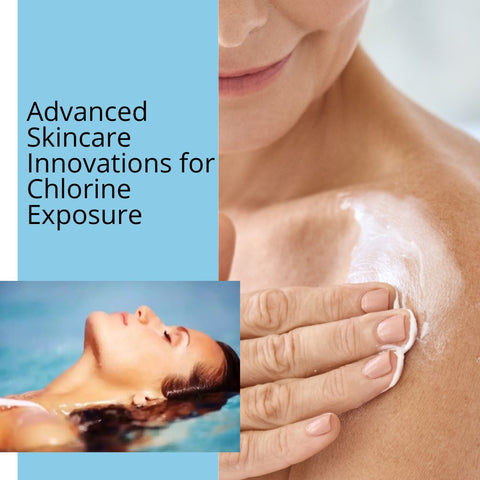
Advanced skincare innovations can provide effective solutions for combating chlorine's damaging effects on the skin. Here are some advanced technologies and products to consider:
-
Advanced barrier repair creams use lipid-rich ingredients such as ceramides, cholesterol, and fatty acids to help restore and strengthen the skin's natural barrier. These creams help to replenish moisture, prevent water loss, and protect the skin from chlorine exposure.
-
Chelating agents are chemicals that bind to metals such as chlorine and neutralise their effects on the skin. Skincare products containing chelating agents, such as EDTA (ethylenediaminetetraacetic acid) or citric acid, can help remove chlorine residue from the skin while reducing irritation and dryness.
-
Hydrolyzed collagen treatments deliver small, bioavailable collagen peptides deep into the skin, stimulating collagen production and repairing damaged skin cells. These treatments improve skin elasticity, firmness, and hydration while reducing the appearance of fine lines and wrinkles caused by chlorine exposure.
-
Advanced antioxidant serums contain powerful antioxidants such as vitamin C, vitamin E, ferulic acid, and resveratrol, which protect the skin from oxidative stress and free radical damage caused by chlorine exposure. These serums work to neutralise harmful molecules, reduce inflammation, and promote skin repair and regeneration.
-
DNA repair enzymes are cutting-edge skincare components that aid in repairing DNA damage brought on by UV rays and chlorine exposure. These enzymes help to repair and restore the skin's DNA, preventing premature ageing, hyperpigmentation, and skin cancer.
-
Probiotic skincare products contain beneficial bacteria that help restore the skin's microbiome and strengthen its natural defences against environmental aggressors such as chlorine. These products improve skin health, balance oil production, and alleviate the inflammation and irritation caused by chlorine exposure.
-
Adaptive skincare technology analyses the skin's needs using advanced algorithms and sensor technology and adjusts skincare formulations accordingly. These innovative products provide personalised skincare solutions based on your specific skin concerns, such as hydration, barrier repair, and antioxidant protection against chlorine damage.
-
Biofilm disruptors are advanced skincare ingredients that target and degrade biofilms, which are protective layers of bacteria and debris that can form on the skin's surface following chlorine exposure. These ingredients cleanse and detoxify the skin by disrupting biofilms, thereby preventing clogged pores, acne breakouts, and irritation.
The Latest in Barrier Creams and Protective Technologies
Barrier creams and protective technologies have advanced dramatically in recent years, providing improved protection against environmental stressors such as chlorine exposure. In this field, recent developments include multi-layered protection, environmental shielding complexes, biofilm disruption technology, adaptive barrier technology, advanced barrier repair formulations, water-resistant formulations, antioxidant-rich ingredients, and sustainable and environmentally friendly formulations. By incorporating the most recent advances in barrier creams and protective technologies into your skincare routine, you can effectively protect your skin from chlorine exposure while preserving its health, moisture, and resilience.
Revolutionary Skincare Products to Combat Chlorine Effects
Revolutionary skincare products have emerged to combat the effects of chlorine on the skin. These products use innovative formulations and cutting-edge technologies to provide effective protection, repair, and hydration. Here are several examples:
-
Chlorine Neutralising Sprays: These sprays contain special ingredients that neutralise chlorine on the skin's surface, reducing irritation and dryness. They are easy to use and can be applied immediately after swimming to remove chlorine residue.
-
Barrier Repair Serums: These lightweight formulations use ceramides, fatty acids, and peptides to repair and strengthen the skin's natural barrier. They help to restore moisture, prevent water loss, and protect the skin from chlorine damage.
-
Antioxidant-Rich Moisturizers: Moisturizers containing powerful antioxidants such as vitamin C, vitamin E, and resveratrol help protect the skin from the oxidative stress caused by chlorine exposure. They neutralise free radicals, reduce inflammation, and stimulate skin repair and regeneration.
-
Hydrogel masks: To restore moisture and calm irritated skin, hydrogel masks are infused with hydrating and soothing ingredients like cucumber extract, aloe vera, and hyaluronic acid. They help restore the skin's natural balance and offer an intense hydration boost.
-
DNA Repair Creams: Advanced ingredients like peptides and DNA repair enzymes are found in DNA repair creams, which aid in repairing DNA damage brought on by exposure to chlorine. They enhance general skin health, minimise ageing symptoms, and encourage skin renewal.
-
Probiotic Skincare: Products containing probiotics help strengthen the skin's natural defences against environmental stressors like chlorine and help restore the skin's microbiome. They lessen irritation and inflammation, balance oil production, and improve skin health.
-
Barrier Protection Balms: To protect the skin from UV rays, chlorine, and other environmental aggressors, barrier protection balms form a protective barrier on the skin's surface. They protect and moisturise the skin with nourishing ingredients like coconut oil, beeswax, and shea butter.
-
Chelating Cleansers: These products have chemicals in them that bind to metals like chlorine to remove them from the skin's surface. They leave the skin feeling clean, hydrated, and renewed by effectively cleansing it without removing its natural oils.
These revolutionary skincare products provide effective solutions for combating the damaging effects of chlorine on the skin. By incorporating them into your skincare routine, you can protect, repair, and hydrate your skin, ensuring that it remains healthy and vital even after swimming in chlorinated pools.
Dermatologist-Recommended Practices for Healthy Skin Post-Swim
Dermatologists advocate many procedures for maintaining healthy skin after swimming, particularly in chlorinated water. Here are their top recommendations: shower right after, use a gentle cleanser, moisturise well, protect your lips, rehydrate your body, protect your hair, apply sunscreen, wear eye protection, exfoliate periodically, and see a dermatologist. Following these dermatologist-recommended procedures will help you keep healthy, bright skin even after swimming in chlorinated pools.
Embracing Healthy Swimming Habits Without Compromising Skin Health
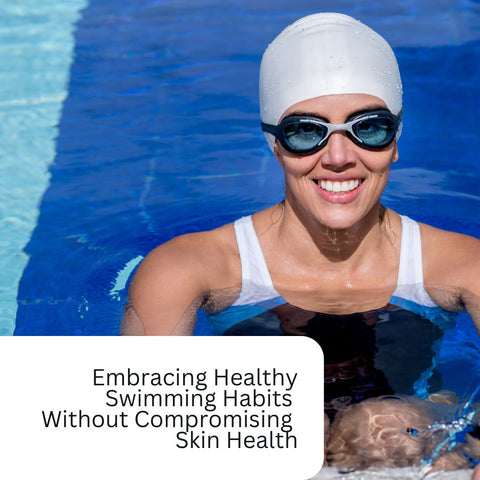
Developing healthy swimming practices is critical for general well-being while preserving skin health. Tips for keeping your skin healthy while swimming include pre-swim preparation, post-swim care, healthy lifestyle habits, a regular skincare routine, and professional assistance. By adding these healthy swimming behaviours to your skincare routine, you may enjoy swimming while keeping your skin healthy and bright.
































